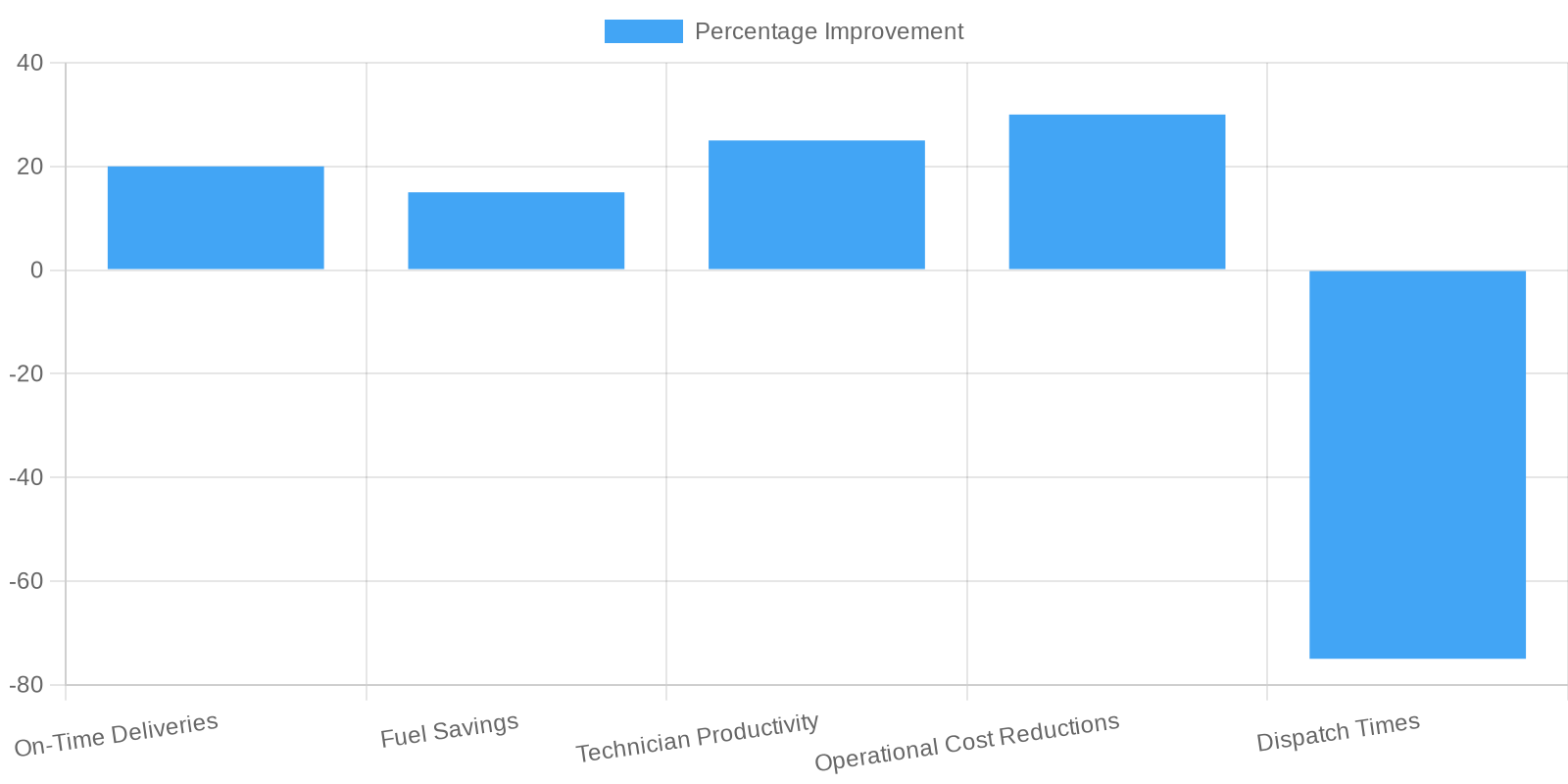In today’s fast-paced logistics environment, fleet operations hinge on the right dispatching software. Companies that use advanced fleet dispatching solutions can boost efficiency by as much as 30 percent. This isn’t just a number; it leads to shorter response times, better communication, and fewer manual errors. As businesses navigate scheduling, routing, and workforce management complexities, they face a key question: How can they choose the right dispatching software to effectively gain these benefits? This article will explore essential considerations for selecting dispatching software, helping your fleet not only survive but thrive in a competitive market.
Whether you are an established service provider or a new fleet operator, knowing how to select the right tools is critical. The right technology optimizes routes, tracks logistics in real-time, and enhances your service quality to meet growing customer expectations.
Join us as we dive into the details of fleet dispatching software, highlighting the features that can transform your operations and the pricing models that fit your budget.
Considerations for Evaluating Fleet Dispatching Software
When businesses evaluate fleet dispatching software, several key considerations are essential for making an informed decision. These include:
- Pricing Models: Businesses should understand the different pricing models available, such as subscription-based, one-time payment, or pay-per-use options. A subscription model may offer lower risk with more flexibility, which can be beneficial for growing companies.
- Feature Sets: It’s crucial to assess the features that the software offers. Key functionalities may include real-time scheduling, automated routing, GPS tracking, work order management, and reporting tools that enhance fleet management efficiency.
- Ease of Use: The user interface plays a significant role in adoption rates among staff. Software that is intuitive and easy to navigate can reduce training time and improve overall productivity.
- Customer Support: Reliable customer support is vital. Businesses should consider the availability of support (24/7 vs. business hours), the channels provided (phone, chat, email), and whether dedicated account managers are offered.
- Compatibility with Existing Systems: Compatibility with current technology and systems is essential to ensure seamless integration. Software that can work alongside existing HR, billing, and inventory management systems can prevent operational disruptions and enhance efficiency.
- Scalability: As a business grows, its dispatching needs may change. Evaluating if the software can scale to meet future demands is important for long-term investment.
By focusing on these considerations, businesses can choose the right fleet dispatching software that aligns with their operational needs and budget.

Evaluating Dispatching Software Pricing Models
When evaluating dispatching software pricing models, businesses typically choose between monthly subscription plans and long-term contracts. Each option offers distinct advantages, particularly for growing businesses.
Monthly Subscription Plans:
- Flexibility and Scalability: Monthly plans allow businesses to adjust their software usage as needs evolve, making them ideal for startups or companies experiencing rapid growth. This flexibility enables organizations to scale services up or down without significant financial commitments.
- Lower Initial Investment: With no substantial upfront costs, monthly subscriptions ease budget constraints, allowing businesses to allocate resources to other critical areas.
- Reduced Risk: The ability to cancel or modify subscriptions with minimal notice minimizes financial risk, which is beneficial for companies testing new software solutions or those with fluctuating needs.
Long-Term Contracts:
- Cost Savings: Committing to annual or multi-year contracts often results in significant discounts, typically ranging from 10-30 percent compared to monthly plans. This can lead to substantial savings over time.
- Predictable Budgeting: Long-term agreements provide financial stability, enabling better cash flow management and strategic planning. This predictability is advantageous for businesses aiming to forecast expenses accurately.
- Enhanced Support and Features: Vendors may offer premium features, dedicated support, or additional services to clients who commit to longer contracts, adding value to the investment.
Considerations for Growing Businesses:
- Adaptability: Rapidly expanding companies may prefer monthly subscriptions to maintain the flexibility needed to adjust services as operations scale.
- Cost-Benefit Analysis: While long-term contracts offer discounts, they require a larger upfront commitment. Businesses should assess whether the immediate savings align with their growth projections and cash flow capabilities.
- Vendor Reliability: Before entering a long-term contract, it’s crucial to evaluate the vendor’s track record, support quality, and product roadmap to ensure they can meet evolving business needs.
In summary, the choice between monthly subscriptions and long-term contracts depends on a business’s current stage, growth trajectory, and financial strategy. Monthly plans offer flexibility and lower initial costs, suitable for businesses in flux, while long-term contracts provide cost savings and stability, beneficial for companies with predictable needs and a clear growth path.
| Vendor | Pricing | Key Features | Target User Base | Customer Support |
|---|---|---|---|---|
| Samsara | $27 – $33 per vehicle monthly | Real-time GPS tracking, telematics integration, automated alerts, detailed analytics | Small to medium-sized businesses | 24/7 support via email, chat, phone; online knowledge base |
| Dispatch | Contact for quote | Real-time job tracking, automated scheduling, integration with third-party applications | Service businesses requiring scheduling | Email and phone support |
| TruckingOffice | $20/month (1-2 Trucks) | Fleet management, GPS tracking, customer/driver management, IFTA reporting | Small to medium-sized trucking companies | Email and phone support |
| Verizon Connect | $20 – $40 per vehicle monthly | Real-time GPS tracking, driver behavior monitoring, compliance management | Businesses of all sizes | Live chat, chatbot, and phone support |
When choosing a dispatch software vendor, businesses should evaluate these factors based on their specific needs, fleet size, and budget.
Key Features of Dispatching Software
Dispatching software plays a pivotal role in refining fleet management through a variety of essential features that enhance operational efficiency. Here are the key features to consider:
- Real-Time Scheduling: One of the standout features of dispatching software is its ability to facilitate real-time scheduling. This functionality enables dispatchers to assign tasks and make adjustments on the fly, accommodating any last-minute changes such as job cancellations or emergency requests. WePro’s drag-and-drop calendar feature exemplifies this benefit, allowing quick resource reallocation to ensure optimal utilization and responsiveness to unforeseen challenges [WePro].
- Automated Routing: Automated routing is crucial for minimizing travel time and operational costs. Utilizing advanced algorithms that factor in elements such as current traffic conditions, vehicle capacities, and specific delivery windows, this feature ensures the most efficient route is taken. Traxroot Dispatch™ claims that their AI-driven routing can lead to an 18% increase in revenue and 40% shorter routes concerning travel time and fuel consumption [Traxroot].
- GPS Tracking: The integration of GPS tracking enhances visibility into the location and status of drivers in real time. This feature allows dispatchers to oversee operations proactively and improves communication with customers by providing accurate delivery updates. According to DispatchTrack, GPS mapping not only aids drivers in saving time and fuel but also allows dispatchers to monitor key performance metrics effectively [DispatchTrack].
- Work Order Management: Centralized work order management simplifies the processes of creating, assigning, and tracking tasks. This streamlining results in fewer manual errors and guarantees that tasks are completed on schedule. Field Squared offers a drag-and-drop scheduling interface, enabling efficient management of work orders, complete with real-time updates on their status [Field Squared].
In conclusion, the integration of these key features in dispatching software significantly optimizes resource allocation, enhances service delivery, and ultimately contributes to reduced operational costs and improved customer satisfaction. Businesses utilizing such software can expect efficient, timely operations tailored to meet rising customer expectations and market demands.
The advantages of dispatch software are pronounced, especially when highlighted by industry experts. One expert noted,
“Dispatch software is honestly a lifesaver for service companies trying to keep up with daily demands.”
This statement underscores the software’s role as an essential tool for managing the operational pressures that service companies face on a day-to-day basis. The effectiveness of such systems can directly affect how fluidly a business runs; without adequate dispatch solutions, companies risk falling behind in responsiveness and efficiency.
Additionally, another quote succinctly states,
“The big wins? Quicker response times, smoother communication, way fewer manual slip-ups, better overall organization.”
This comment elaborates on the tangible benefits associated with dispatch software, emphasizing improved response times and reduced errors—two crucial factors in maintaining quality service. In a competitive market where time is of the essence, companies equipped with robust dispatch solutions can not only optimize their operations but also enhance their service quality, leading to improved customer satisfaction.
The significance of adopting dispatch software in service firms cannot be overstated. As the industry moves towards more digital and efficient solutions, the software facilitates not only logistical coordination, but also serves to connect staff and customers through better communication. This integration is essential for sustaining productivity and delivering high-caliber service.
Reports indicate that companies leveraging advanced dispatch systems report up to a 30% boost in operational efficiency, with many experiencing a significant reduction in response times and human error. This data reinforces the expert quotes and showcases the necessity of embracing effective dispatch software to thrive in today’s fast-paced service environment.
In conclusion, selecting the right dispatching software is crucial for any business aiming to streamline fleet management and enhance operational efficiency. As we’ve discussed, it is important to assess multiple factors including pricing models, essential features, ease of use, and customer support. Understanding your unique business needs will enable you to identify the solutions that best suit your requirements. With a range of options available from monthly subscriptions to long-term contracts, businesses should weigh the advantages and potential drawbacks related to their specific operational circumstances.
Now is the time to take action. Evaluate your options, gather feedback from your team, and consider piloting a few software solutions that stand out to you. Making the right choice in dispatching software can transform your fleet operations, ensuring that not only are you meeting the demands of today’s fast-paced logistics environment but also positioning yourself for future growth. Don’t delay—invest in the tools that will elevate your service quality and efficiency.
In conclusion, selecting the right dispatching software is crucial for any business aiming to streamline fleet management and enhance operational efficiency. As we’ve discussed, it is important to assess multiple factors including pricing models, essential features, ease of use, and customer support. Understanding your unique business needs will enable you to identify the solutions that best suit your requirements. With a range of options available from monthly subscriptions to long-term contracts, businesses should weigh the advantages and potential drawbacks related to their specific operational circumstances.
Now is the time to take action. Evaluate your options, gather feedback from your team, and consider piloting a few software solutions that stand out to you. Making the right choice in dispatching software can transform your fleet operations, ensuring that not only are you meeting the demands of today’s fast-paced logistics environment but also positioning yourself for future growth. Don’t delay—seize the opportunity to invest in the tools that will elevate your service quality, enhance efficiency, and drive your business to new heights.
Statistics Demonstrating the Benefits of Dispatching Software
Implementing dispatching software has led to significant operational improvements and efficiency gains for businesses across various industries. Below are several statistics and case studies that highlight these benefits:
- Enhanced On-Time Deliveries and Fuel Savings:
- A small delivery company experienced a 20% increase in on-time deliveries after adopting dispatch software, resulting in higher customer satisfaction and repeat business.
- A mid-sized logistics company reduced fuel costs by 15% by optimizing routes and minimizing idle time using dispatch software.
- A large transportation company improved driver productivity by 25% by providing real-time job updates and eliminating manual paperwork through dispatch software.
Source: Grow With Supply Chain
- Improved Technician Productivity and Workforce Utilization:
- Businesses with automated dispatch systems have seen up to a 30% increase in productivity.
- AI-driven scheduling has boosted technician efficiency by 25%, attributed to fewer errors and quicker response times.
Source: FieldAX
- Operational Cost Reductions:
- Implementing effective dispatch solutions can lead to a reduction of up to 15% in operational costs.
Source: MoldStud
- Optimized Routing and Delivery Times:
- A leading package shipping company implemented a sophisticated route optimization tool and saw a 20% reduction in delivery times and a 15% decrease in fuel costs.
Source: Cigo Tracker
- Reduction in Dispatch Times and Increased Efficiency:
- S&R Trucking transitioned from a legacy system to a modern dispatch platform, resulting in a 75% reduction in dispatch times and saving 3,500 hours per year in staff time.
Source: Trucking 42
- Enhanced Communication and Real-Time Tracking:
- A retail chain improved its dispatch management by leveraging real-time tracking technology, leading to a 25% reduction in delivery times and a significant decrease in customer complaints.
Source: JRD Truck Solutions
These examples underscore the substantial benefits businesses can achieve by integrating dispatching software into their operations, including increased productivity, cost savings, improved customer satisfaction, and enhanced overall efficiency.

SEO Keyword Integration for Fleet Management
To enhance the SEO effectiveness of our article on fleet dispatching software, we will integrate a comprehensive list of keywords pertaining to the topics of fleet management and dispatch software. Below are recommended keywords that can effectively optimize our content:
Primary Keywords:
- Dispatching Software
- Fleet Management Solutions
- Fleet Tracking Technologies
Related Keywords:
- Logistics Software Solutions
- GPS Tracking Systems
- Real-Time Scheduling Software
- Automated Routing Systems
- Vehicle Telematics
- Fleet Maintenance Management
- Fleet Compliance Monitoring
- Fleet Optimization Tools
- Mobile Dispatch Applications
- Route Planning Software
- Transport Management Systems
- AI-Driven Dispatch Software
- Video Telematics Solutions
- Electronic Logging Device (ELD)
Long-Tail Keywords:
- Best Fleet Management Software for Small Businesses
- Efficient Dispatch Solutions for Logistics Companies
- Cloud-Based Fleet Management Systems
- Cost-Effective Dispatch Software for Growing Fleets
Geographic Keywords (for Local SEO):
- Fleet Management Services in [City]
- Local Dispatch Software Providers [Region]
Incorporating these keywords strategically throughout the article will improve our visibility in search engines and attract more targeted traffic. It is essential to use these keywords naturally within the content to maintain readability while ensuring we address search intent effectively.
Importance of Effective Keyword Usage
Utilizing these keywords can help:
- Increase organic search visibility
- Drive more qualified traffic
- Enhance brand awareness
- Improve lead generation and sales conversions
Incorporating relevant keywords into our content will not only align with industry trends but will also tailor the information to the needs of our target audience, creating a more useful resource.

